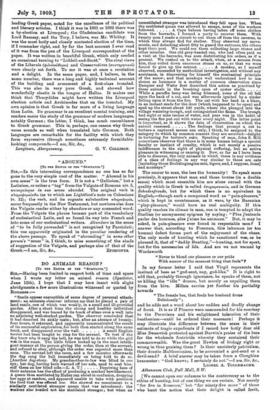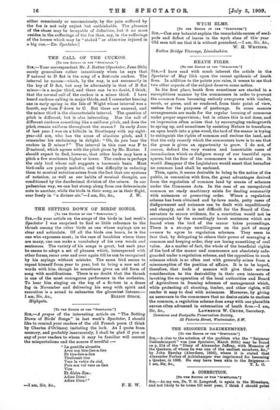DO ANIMALS REASON ?
[To THE EDVZOB, OF THE " SPECTAT011.1 Sin,—Having been limited in respect both of time and space when I wrote my letter on animal reason (Spectator, June 12th), I hope that I may here Wsert with slight
abridgments a few more illustrations witnessed or (Noted by Row sues
"Snails appear susceptible of some degree of personal attach, merit: an accurate ebserver informs we that he placed a pair of land snails, one of which was weakly, in a small and ill-provided garden. After a short time the strong and healthy individual disappeared, and was traced by its track of slime over a wall into an adjoining welbstocked garden. The observer concluded that it had deserted its sickly mate; but, after an absence of twenty- four hours, it returned, and apparently communicated the result of its successful exploration, for both then started along the same track, and disappeared over the wall A small English terrier had been -taught to ring for the servant. To test if the dog knew why it rang the bell, ho was told to do so while the girl was in the room. The little fellow looked up in the most intelli- gent manner at the person giving the order, then at the servant, and refasell to obey, although the order was repeated more than once. The servant left the room, and a few minutes afterwards the dog rang the bell immediately on being told to do so- [Another dog-story. My grandmother-in-law was blind in one eye; her dog, having been warned off her sofa, used to seat him- self there on her blind side.—L. A. T.] Depriving bees of their antenna has the effect of producing a marked bewilderment. A queen thus mutilated by Haber ran about in confusion, dropping her eggs at random, and appeared unable to take with precision the food that was offered her. She showed no resentment to a eimilaely mutilated stranger queen that was introduced ; the workerp also heeded not tlie mutilated stranger; but when an unmutilated stranger was introduced they fell upon her. When the mutilated queen was allowed to escape, none of the workers followed A Cape baboon having taken off some clothes from the barracks, I formed a party to recover them. With twenty men I made a circuit to cut them off from the caverns, to which they always fled for shelter. They observed my move- ments, and detaching about fifty to guard the entrance, the others kept their post. We could see them collecting large stones and other missiles. One old grey-headed one, who had often paid us a visit at the barracks, was seen distributing his orders, as if a general. We rushed on to the attack, when, at a scream from him, they rolled down enormous stones on us, so that we were forced to give up the contest A monkey, as I myself observed, succeeded by methodical investigation, and without any assistance, in discovering for himself the mechanical principle of the screw; and that monkeys well understand how to use stones as hammers is a matter of common observation since Dampier and Wafer first described this action as practised by these animals in the breaking open of oyster shells. . . . . . While a paraffin lamp was being trimmed, some of the oil fell upon the back of a cat, and was afterwards ignited by a cinder falling upon it from the fire. The cat with her back in a blaze, in an instant made for the door (which happened to be open) and sped up the street about 100 yards, where she plunged into the village watering-trough, and extinguished the flame. The trough had eight or nine inches of water, and puss was in the habit of seeing the fire put out with water every night. The latter point is important, as it shows the data of observation on which the animal reasoned The feelings that prompt a cat to torture a captured mouse can only, I think, be assigned to the category to which by common consent they are ascribed—delight in torturing for torture's sake. Speaking of man, John S. Mill somewhere observes that there is in some human beings a special faculty or instinct of cruelty, which is not merely a passive indifference to the sight of physical suffering, but an active pleasure in witnessing or causing it. Now, so far as I have been able to discover, the only animals in which there is any evidence of a class of feelings in any way similar to these are cats [including those Brobdingnagian oats, tigers, and, I suppose, lions] and monkeys."
The nearer to man, the less the humanity ! To speak more precisely, it appears that man and those brutes (in a double sense) which most resemble him are alone cursed with the quality which in Greek is called Wirtxayescucia, and in German Schadenfreude, but for which there is no equivalent in English,—though such a compound word as "pain-pleasure," which is kept in countenance, as it were, by the Baconian "play-pleasure," would have no real ambiguity. If this quality reaches its climax in man, one is tempted to adapt the Staelian (or anonymous) epigram by saying: "Plus fentends parler des hommes, plus j'aime les animaux." But, it may be
asked, is pain-pleasure ever found in respectable men? I answer that, according to Freeman, this inhuman (or too human) defect forms part of the enjoyment of the chase. The only mode of hunting which he sanctioned was, as he phrased it, that of "daddy Bunting,"—hunting, not for sport, but for the necessaries of life. And are we not warned by Wordsworth "Never to blend our pleasure or our pride With sorrow of the meanest thing that feels"!
In my former letter I said that Virgil represents the instinct of bees as "god-sent, nay, god-like." It is right to add that, probably through ignorance, he speaks of them, not as killing the "idle" drones, but merely as expelling them from the hive. Milton carries yet further his partiality towards "The female bee, that feeds her husband drone Deliciously " ; and he adds not a word about her sudden and deadly change of front. It is as if Pizarro ware commended for his courtesy to the Peruvians and his enlightened toleration of their heathenism—uatil he ordered their massacre ! Perhaps it may illustrate the difference between the sexes in their estimate of tragic expedients if I record how hotly dear old Miss Swanwick protested against Darwin's praise of the bees for the wholesale fratricide whereby they sustained their commonwealth. Was the great Newton of biology right or
wrong in thus praising them ? Is their nnsisterly patriotism, their drastic Malthusianism, t.o be accounted a god-send or a devil-send? A brief answer may be taken from a Cloughian hexameter "God knows ; I certainly do not."—I ate, Sir, 8r..c., LIONEL A. TOLLEMICHE.
Atheneum Club, Pall Mall, S. W.
[We cannot open our columns to the controversy as to the ethics of hunting, but of one thing we are certain. Not merely " for five in fivescore," but "for ninety-five more" of those who hunt the notion that their delight is called fprth,
either consciously or unconsciously, by the pain suffered by the fox is not only unjust but unthinkable. The pleasure of the chase may be incapable of definition, but it no more resides in the sufferings of the fox than, say, in the sufferings of the horses which may be " staked" or otherwise injured in a big run.—ED. Spectator.















































 Previous page
Previous page